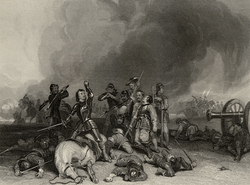Battle of Hopton Heath
| Battle of Hopton Heath | |||||||
|---|---|---|---|---|---|---|---|
| Part of the First English Civil War | |||||||
 The Battle of Hopton Heath, engraved by J. T. Willmore after George Cattermole | |||||||
| |||||||
| Belligerents | |||||||
| Royalists | Parliamentarians | ||||||
| Commanders and leaders | |||||||
| Spencer Compton, 2nd Earl of Northampton † | Sir William Brereton, 1st Baronet | ||||||
| Strength | |||||||
|
1,200: 1,100 cavalry, 100 infantry, artillery |
1,500: infantry, cavalry, artillery | ||||||
The Battle of Hopton Heath, in Staffordshire, was a battle of the First English Civil War, fought on Sunday 19 March 1643 between Parliamentarian forces led by Sir John Gell, 1st Baronet and Sir William Brereton and a Royalist force under Spencer Compton, 2nd Earl of Northampton. The battle ended at nightfall, with the victory remaining a matter of opinion: that the Parliamentarian foot were still in position at nightfall when, as the Royalists themselves admitted, they drew back a little; or that next morning the Royalists occupied the field after the Parliamentarians retreated in the night. The Royalists had captured eight guns, but the Parliamentarians considered their killing of the enemy commander, the Earl of Northampton, of equal significance.
Background
Gell had successfully taken the town of Lichfield in Staffordshire and was on his way with about 1,500 men and some artillery pieces to join Brereton in a projected attack on the town of Stafford.
Battle
They met at Hopton Heath and were attacked there by the Royalists, whose force consisted of about 1,100 cavalry, 100 foot and artillery, including a large artillery piece called "Roaring Meg".
After an artillery barrage the Royalist cavalry charged the entrenched Parliamentarians, putting Gell's dragoons and his and Brereton's horse to flight. A second charge was repelled by Gell's musketeers and Northampton was unhorsed. He refused to surrender and was killed.
Nighttime withdrawals
During the night the Royalists retired towards Stafford to regroup, and the Parliamentarian troops withdrew towards Chartley, leaving a large part of Gell's artillery in Royalist hands. Brereton withdrew to Nantwich while Gell marched through Uttoxeter to Derby, taking Northampton's body with him. He attempted to ransom the Earl's body for the return of the captured artillery pieces, without success. The Royalists further refused a request to refund Gell for the cost of embalming their leader's body, which was then buried at All Hallows Church in Derby.
References
- Plant, David. Hopton Heath, Staffordshire, 19 March 1643, on The British Civil Wars & Commonwealth website
- Martyn Bennett, Spencer Compton, second earl of Northampton, Oxford DNB, 2004
- English Heritage Battlefield Report: Hopton Heath 1643
External links
- The Battle of Hopton Heath, 1643: http://staffordshirehistories.co.uk/52612.html
Coordinates: 52°50′06″N 2°04′01″W / 52.835°N 2.067°W